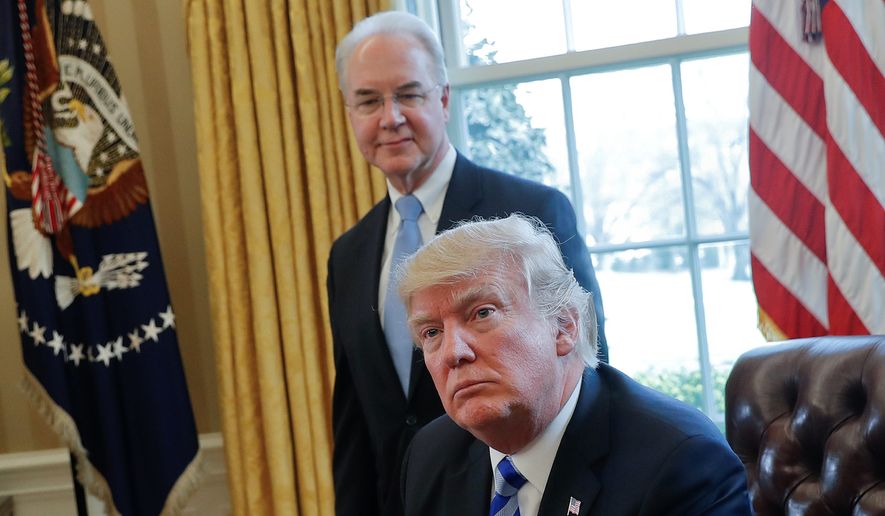With health care stalled on Capitol Hill, the pressure now shifts to President Trump and new Health and Human Services Secretary Thomas Price, who will have to manage a law Republicans say is failing on its own — without giving Democrats more ammunition to say it was the GOP that killed it.
Rather than face a roll call they were going to lose, House GOP leaders called off a vote Friday that was supposed to be phase one of a three-pronged plan to repeal and replace Obamacare’s heavy mandates with free market reforms.
Without the repeal, however, phase two — a series of executive actions designed to chip away at Obamacare’s expansive reach — is much more difficult, House Speaker Paul D. Ryan told reporters just minutes after the GOP bill collapsed Friday.
“This bill would have made what we call phase two much, much better,” Mr. Ryan said. “Nevertheless, I think there are some things that the secretary of HHS can do to try and sort of stabilize things, but really we need this bill to make it better.”
The bill would have been able to eat into some of the bigger parts of the Affordable Care Act, such as requirements that consumers pay for maternity care and mental health coverage, even if they don’t need those services.
Without the bill, Mr. Price can only make smaller changes, such as limiting the kinds of drugs or services that are covered. And even then, he cannot slash them below what’s covered in a typical employer-sponsored plan, according to policy analysts.
Republicans also wanted to set up high-risk pools to help states subsidize high-risk patients, freeing up healthier people to choose the types of plans they want instead of effectively subsidizing more robust coverage for sicker consumers.
“That is not now going to happen, and therefore he won’t be able to deploy that policy tool that we think is better than Obamacare,” Mr. Ryan said.
Some rank-and-file GOP members say Congress shouldn’t give up on legislative efforts, though, casting Friday’s fiasco as a timeout in a much longer contest.
“The responsible thing is to keep working on this, because it’s an important issue for the American people,” said Rep. Justin Amash, Michigan Republican and member of the conservative House Freedom Caucus, which helped doom the bill, arguing it didn’t go far enough in killing Obamacare.
For now, HHS is forced to point to efforts it already had begun to provide patients, insurers and state leaders immediate “relief” from Obamacare.
It is tightening up eligibility for “special enrollment periods,” which allow people to sign up outside of the normal enrollment season. Insurers say they have been subject to abuse by people who, rather than paying premiums over time, wait until they get sick to sign up and submit costly medical claims.
Mr. Price also told governors he is ready to use authority embedded in Obamacare, known as Section 1332 waivers, that lets states forge their own health reforms if they would outperform the current program.
Most recently, Alaska set up a “reinsurance” program so that insurers can contribute funds that protect them from big losses later on so that they don’t raise their rates even higher under Obamacare.
And some states are eyeing conservative reforms to Medicaid, the federal-state insurance program for the poor, which the Obama administration resisted but would find favor under Mr. Trump, such as imposing work requirements or small premiums on beneficiaries.
But the most pressing decision facing the White House is whether to continue cost-sharing payments that reimburse insurers for helping low-income customers.
Millions of Obamacare customers with incomes between 100 percent and 250 percent of the poverty line rely on the payments, and — with repeal off the table — health plans are still required to reduce their out-of-pocket costs whether they’re reimbursed or not.
The House Republicans had won a ruling last year that President Obama was breaking the law by making payments to insurance companies even though Congress had specifically canceled that money.
The Trump administration could easily drop the appeal, but the White House and Republicans now realize they may have to keep the payments flowing until they figure out how to get rid of Obamacare.
Timothy Jost, a law professor at Washington and Lee University who closely tracks the debate, said a decision to retain those payments should be coupled with a clear statement that they intend to enforce the individual mandate designed to keep premiums down.
“Everything else is less important,” he said.
Yet Obamacare supporters aren’t expecting Mr. Trump to shore up the program, since it would undermine his push to let the program unravel and force Democrats to the negotiating table later on.
Mr. Trump yanked up to $5 million in ads touting the main Obamacare website, HealthCare.gov, ahead of the critical Jan. 31 deadline to get covered for 2017, prompting Democrats to cry “sabotage” and request an independent probe by the HHS inspector general.
Mr. Trump also issued an executive order targeting the law within hours of taking office. As a result, the IRS said it would still process returns even if they don’t address their health coverage status.
“I anticipate we will see rate increases and health insurer departures from health markets because of President Trump’s actions undermining the ACA,” California Insurance Commission Dave Jones said Friday. “President Trump likes to shift blame to others, but it’s his actions which are undermining the ACA.”
• Tom Howell Jr. can be reached at thowell@washingtontimes.com.




Please read our comment policy before commenting.